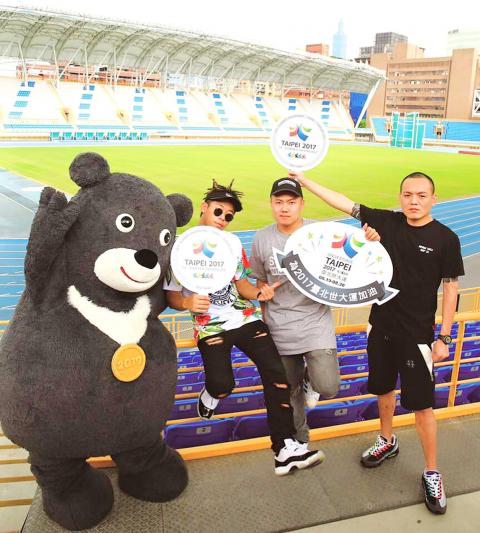The Taipei Universiade Organizing Committee might replace local hip-hop trio Jiu Yi Yi (玖壹壹) as the spokespersons for the sporting event, Taipei Mayor Ko Wen-je (柯文哲) said yesterday, after the group sparked backlashes at home and overseas over a music video that has been criticized as offensive toward several religions.
Ko made the remark in response to media queries over whether the city government would dismiss the group, who agreed to be the face of the Taipei 2017 Summer Universiade for free.
Ko initially said the committee had not made any plans to replace Jiu Yi Yi, adding: “If something went wrong, just correct it.”

Photo provided by Ainoko Production Inc
When asked how the city would cope with the negative feedback the group has triggered in Malaysia, Ko said the committee would consider replacing the group.
“We will have more discussions about this matter. I do not think knee-jerk reactions are necessary,” he added.
In a recently released music video for a song titled Oh My God, the three Jiu Yi Yi members are seen dressed up as the Prophet Mohammed, Buddhist monk Xuanzang (玄奘) and a Taoist monk.
Malaysian rapper Namewee, whose real name is Wee Meng Chee (黃明志), and who is a collaborator of the group, wrote the song and portrayed Jesus Christ in the video.
In the video, “Mohammed” swaggers about several locations in Malaysia, including a mosque, carrying a rifle.
The four dressed as religious figures later indulge themselves with alcohol and a game of poker, during which they have an argument, prompting “Mohammed” to point his rifle at the others.
The video triggered an outpouring of online criticism almost immediately after its release, with many netizens calling the group “ignorant.”
Citing the Charlie Hebdo shootings in Paris last year, Christopher Hall said in a video uploaded to his YouTube channel Dream Lucid that the video could irritate religious extremists and make Taiwan a target of terrorist attacks.
The video has also drawn fire from Malaysian authorities.
Malaysian police on Sunday last week remanded Namewee into custody for questioning over his “intent to insult a religion.”
Jiu Yi Yi, which in Chinese means “911,” posted a video on Facebook in response to the controversy, saying they were approached by Wee to collaborate on the song, adding that the creative direction of the video and song’s lyrics were Wee’s alone.
The song’s message is about four religions living together in peace, the group said.
However, the group did not apologize for stirring up controversy, as many people had demanded, saying that netizens who criticized them had no knowledge of what had occurred and that the negative feedback only made them more determined to continue writing new songs.
The group has created a song for the Universiade, which they performed in front of Taipei City Hall last week to promote the event.
Jiu Yi Yi was nominated for best singing group at this year’s Golden Melody Awards.

DAREDEVIL: Honnold said it had always been a dream of his to climb Taipei 101, while a Netflix producer said the skyscraper was ‘a real icon of this country’ US climber Alex Honnold yesterday took on Taiwan’s tallest building, becoming the first person to scale Taipei 101 without a rope, harness or safety net. Hundreds of spectators gathered at the base of the 101-story skyscraper to watch Honnold, 40, embark on his daredevil feat, which was also broadcast live on Netflix. Dressed in a red T-shirt and yellow custom-made climbing shoes, Honnold swiftly moved up the southeast face of the glass and steel building. At one point, he stepped onto a platform midway up to wave down at fans and onlookers who were taking photos. People watching from inside

A Vietnamese migrant worker yesterday won NT$12 million (US$379,627) on a Lunar New Year scratch card in Kaohsiung as part of Taiwan Lottery Co’s (台灣彩券) “NT$12 Million Grand Fortune” (1200萬大吉利) game. The man was the first top-prize winner of the new game launched on Jan. 6 to mark the Lunar New Year. Three Vietnamese migrant workers visited a Taiwan Lottery shop on Xinyue Street in Kaohsiung’s Gangshan District (崗山), a store representative said. The player bought multiple tickets and, after winning nothing, held the final lottery ticket in one hand and rubbed the store’s statue of the Maitreya Buddha’s belly with the other,

‘NATO-PLUS’: ‘Our strategic partners in the Indo-Pacific are facing increasing aggression by the Chinese Communist Party,’ US Representative Rob Wittman said The US House of Representatives on Monday released its version of the Consolidated Appropriations Act, which includes US$1.15 billion to support security cooperation with Taiwan. The omnibus act, covering US$1.2 trillion of spending, allocates US$1 billion for the Taiwan Security Cooperation Initiative, as well as US$150 million for the replacement of defense articles and reimbursement of defense services provided to Taiwan. The fund allocations were based on the US National Defense Authorization Act for fiscal 2026 that was passed by the US Congress last month and authorized up to US$1 billion to the US Defense Security Cooperation Agency in support of the

‘COMMITTED TO DETERRENCE’: Washington would stand by its allies, but it can only help as much as countries help themselves, Raymond Greene said The US is committed to deterrence in the first island chain, but it should not bear the burden alone, as “freedom is not free,” American Institute in Taiwan Director Raymond Greene said in a speech at the Institute for National Defense and Security Research’s “Strengthening Resilience: Defense as the Engine of Development” seminar in Taipei yesterday. In the speech, titled “Investing Together and a Secure and Prosperous Future,” Greene highlighted the contributions of US President Donald Trump’s administration to Taiwan’s defense efforts, including the establishment of supply chains for drones and autonomous systems, offers of security assistance and the expansion of